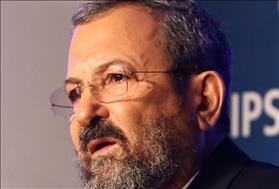Hiddush's contention becomes increasingly validated every day
Israel's Religion and State conflict in the September elections
The unfolding election campaigning provides further validation to Hiddush's contention as to the major role that the clash of religion-&-state can potentially play if properly positioned in shaping Israel's future political trajectory. Avigdor Lieberman (whose political focus on "anti-halakha state" we've described in detail) continues to reap the gains.
Uri Regev 18/07/2019 19:00
Tags: 2019 elections · Avigdor Lieberman · Ehud Barak · Benjamin Netanyahu

Ehud Barak, source: Wikipedia
The unfolding election campaigning provides further validation to Hiddush's contention as to the major role that the clash of religion-&-state can potentially play if properly positioned in shaping Israel's future political trajectory. Avigdor Lieberman (whose political focus on "anti-halakha state" we've described in detail) continues to reap the gains. The most recent election poll has now put him at 10 Knesset seats - that's twice the 5 seats that his party received in the April elections. He has clearly shaped the thrust of the campaign season; a number of political analysts are describing him as the anticipated great winner of this election cycle. Not that he's expected to have the largest party, nor that his strategy will win him the Prime Ministership... rather, the anticipation is that neither political camp will be able to form a coalition without him. Therefore, it will be within his capacity to tilt the results of the elections in either direction. Most likely, he will push in the direction that he has repeatedly declared: a wide-based civil coalition, based upon the Likud and Blue-&-White, with the understanding that he could lend his support to the leader of either party to become Prime Minister (probably the one who will emerge from the elections with more seats).
The critical role religion-state divide will play in the coming elections could be seen this week on a number of levels:
- Netanyahu held a meeting with the leadership of the Likud to discuss campaign strategies and strongly urging them to keep away from and subdue discussion of religion-&-state matters, as the raised awareness and discourse over these issues is hurting the Likud and helping Lieberman's party.
- There was a hullabaloo when a leading television reporter released details about a coalition agreement that was prepared in June on the eve of the realization that Netanyahu did not manage to muster a majority governing coalition and instead opted for new elections. This agreement included some specific, further surrendering to the ultra-Orthodox parties, such as the commitment that the Minister who oversees public works on Shabbat would not exercise his authority to permit these works, unless the Chief Rabbinate were to agree to them. Needless to say the disclosure of this document gave Lieberman and others further ammo.
This week saw ultra-Orthodox leadership extending a virtual bear hug to Avigdor Lieberman.
- The ultra-Orthodox parties have further solidified their change of campaign tactics vis-a-vis Lieberman, for they realize that the more they attack him, the more they are helping him. Instead, this week saw ultra-Orthodox leadership extending a virtual bear hug to Avigdor Lieberman. They publicized a number of accounts and photographs, showing how cooperative he has been with the ultra-Orthodox parties in previous government coalitions. MK Rabbi Gafni, Chair of the Finance Committee and a leader of the Ashkenazi Haredi party stated yesterday: "Lieberman is our friend. Nobody should be surprised if after the elections he will be so once again." The intended discrediting of Lieberman in the eyes of his supporters who are attracted to his rhetoric on religious freedom is obvious.
- Ehud Barak and his party have launched a dramatic new campaign outreach [in Hebrew], based on an upgraded commitment to religious freedom and pluralism, recognizing that it does, indeed, represent real political currency. These are the promises of Barak's "Democratic Israel" party campaign related to religion-&-state: 1) To enact a constitution for Israel in the spirit of the values of the Declaration of Independence and the vision of the prophets of Israel, within two years of the establishment of the government. 2) "Judaism belongs to all of us." Within a year we will pass a law that will allow any person to marry, divorce, and be buried in any way he/she wishes. We will allow public transportation on Shabbat in non-religious neighborhoods. Within a year, the draft law will be abolished, the salaries of the those who serve will be increased, and we will prepare a plan to increase the integration of ultra-Orthodox Israelis into the labor market. Yes to pluralistic Judaism, no to religious coercion. [In the recorded speech that accompanied the official campaign statement, Barak also committed to canceling the religionization in the education system]
- Blue-&-White, however, is still sitting on the fence and still expressing aspirations to leave the door open to aligning with the ultra-Orthodox parties. They are being careful not to antagonize them. Still, yesterday, their leader Benny Gantz was quoted speaking about allowing public transportation on Shabbat in select localities that choose this. This resulted in an immediate rebuke by Minister Rabbi Aryeh Deri (leader of Shas). Hiddush will continue reaching out to Blue-&-White, encouraging them to understand the futility of trying to appease the ultra-Orthodox parties with the misguided hope that they will shift their support away from the Likud. Instead, they should focus on their own constituents and potential constituents who expect them to stand tall and proud for religious freedom and equality.